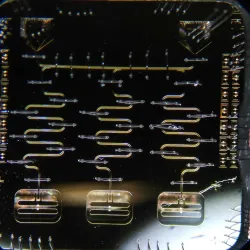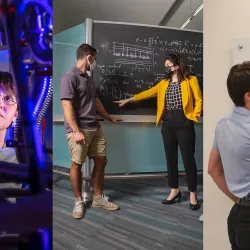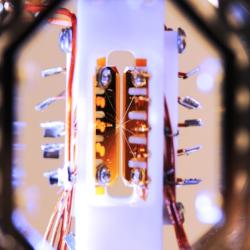College Welcomes Five New Faculty Members this Spring
The College of Computer, Mathematical, and Natural Sciences welcomes five new tenure/tenure-track faculty members to the University of Maryland this spring. Following are brief introductions to the new faculty.
Andrew Childs is an associate professor in the Department of Computer Science and the new co-director of the Joint Center for Quantum Information and Computer Science. He received his Ph.D. in physics from the Massachusetts Institute of Technology in 2004. Childs was a DuBridge Postdoctoral Scholar at Caltech from 2004-2007 and a faculty member in Combinatorics & Optimization and the Institute for Quantum Computing at the University of Waterloo. He is a Senior Fellow of the Canadian Institute for Advanced Research. His research focuses on better understanding the power of quantum systems to process information.
Kelly Hamby is an assistant professor in the Department of Entomology. She received all of her academic degrees and was a postdoctoral scholar at the University of California, Davis, in the Department of Entomology. Her expertise focuses on sustainable integrated pest management strategies for various insect pests. She was awarded a National Science Foundation Graduate Research Fellowship to study molecular mechanisms of target site resistance to insecticides and the John Henry Comstock Graduate Student Award from the Pacific Branch of the Entomological Society of America.
Philip Lee Falk Johnson is an assistant professor in the Department of Biology. He received his B.A. in computer science and biology with honors from Harvard University in 2001 and his Ph.D. in biophysics, with an emphasis in computational and genomic biology, in 2009 from the University of California, Berkeley. Previously, he was a postdoctoral fellow at Emory University conducting research on developing population genetic models of metagenomic data and ancient DNA. He also developed computational tools to validate human genome assembly at the National Center for Biotechnology Information.
Michelle Mazurek is an assistant professor in the Department of Computer Science and the University of Maryland Institute for Advanced Computer Studies. She completed her Ph.D. in electrical and computer engineering at Carnegie Mellon University. Mazurek was awarded Facebook and National Science Foundation: Integrative Graduate Education and Research Traineeship fellowships during her time at Carnegie Mellon. Her research focuses on computer security, with an emphasis on human factors. She is personally interested in understanding security and privacy behavior from real users.
Lai-Xi Wang is a professor in the Department of Chemistry and Biochemistry. He received his Ph.D. from the Chinese Academy of Sciences’ Shanghai Institute of Organic Chemistry and completed postdoctoral studies at Johns Hopkins University and Massachusetts Institute of Technology. He joins UMD from the University of Maryland School of Medicine’s Institute of Human Virology, where he was promoted to full professor with tenure in 2009. Wang conducts research in the field of glycoscience, where he is working to decipher the functions of glycoproteins to ultimately design an effective carbohydrate-based HIV vaccine. Wang received the Melville L. Wolfrom Award in 2014 and the 2004 Young Investigator Award in Carbohydrate Chemistry, both from the American Chemical Society.
Media Relations Contact: Abby Robinson, 301-405-5845, abbyr@umd.edu
Writer: Nikita Mehta
University of Maryland
College of Computer, Mathematical, and Natural Sciences
2300 Symons Hall, College Park, MD 20742
www.cmns.umd.edu
@UMDscience
About the College of Computer, Mathematical, and Natural Sciences
The College of Computer, Mathematical, and Natural Sciences at the University of Maryland educates more than 7,000 future scientific leaders in its undergraduate and graduate programs each year. The college's 10 departments and more than a dozen interdisciplinary research centers foster scientific discovery with annual sponsored research funding exceeding $150 million.







